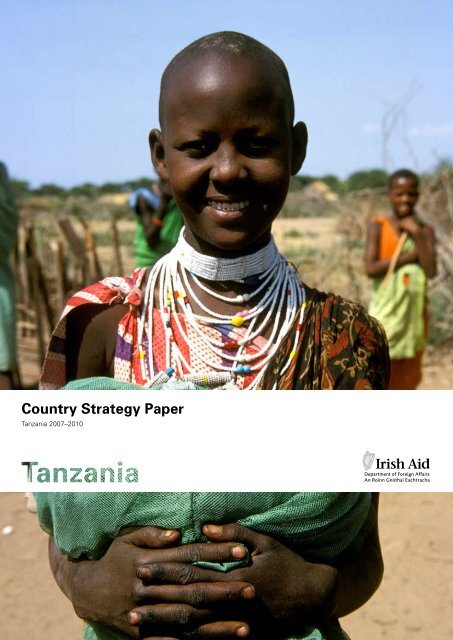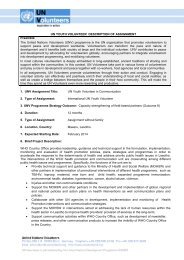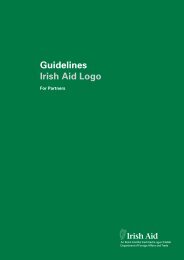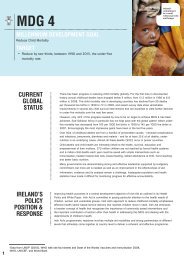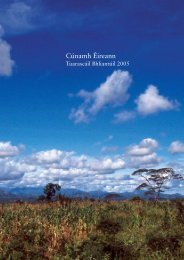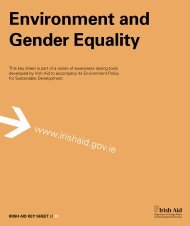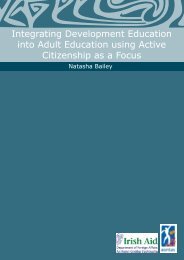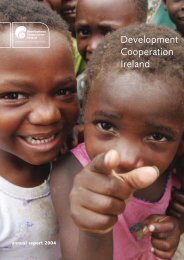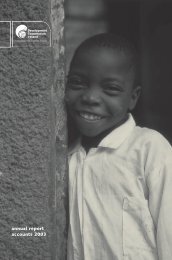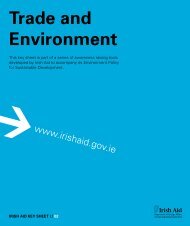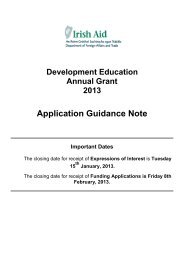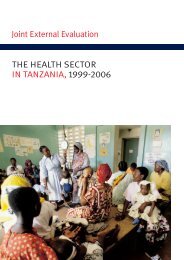Country Strategy Paper - Irish Aid
Country Strategy Paper - Irish Aid
Country Strategy Paper - Irish Aid
You also want an ePaper? Increase the reach of your titles
YUMPU automatically turns print PDFs into web optimized ePapers that Google loves.
<strong>Country</strong> <strong>Strategy</strong> <strong>Paper</strong><br />
Tanzania 2007–2010
Front cover pic:<br />
Masai girl with mosquito net, Gwara, Tanzania
<strong>Country</strong> <strong>Strategy</strong> <strong>Paper</strong> - Tanzania 2007-2010<br />
“ The overall goal of the <strong>Country</strong> <strong>Strategy</strong> <strong>Paper</strong> is to support<br />
the Government of Tanzania’s efforts towards reducing<br />
poverty and vulnerability, promoting growth and increasing<br />
opportunity for the people of Tanzania.<br />
”<br />
<strong>Country</strong> <strong>Strategy</strong> <strong>Paper</strong><br />
Tanzania 2007–2010
<strong>Country</strong> <strong>Strategy</strong> <strong>Paper</strong> - Tanzania 2007-2010
<strong>Country</strong> <strong>Strategy</strong> <strong>Paper</strong> - Tanzania 2007-2010<br />
Contents<br />
Foreword 5<br />
Executive Summary 6<br />
1 Background 7<br />
1.1 <strong>Country</strong> context 7<br />
1.2 The case for increased aid 8<br />
1.3 Policy framework for the CSP 8<br />
1.4 The Joint Assistance <strong>Strategy</strong> of Tanzania 9<br />
2 <strong>Irish</strong> <strong>Aid</strong> programme - Lessons Learned 10<br />
3 The <strong>Strategy</strong> 2007 – 2010 13<br />
4 Putting this strategy into effect 15<br />
4.1 Rural livelihoods and growth 15<br />
4.2 Social development 15<br />
4.3 Good governance 16<br />
4.4 General Budget Support 18<br />
5 Ways of working 20<br />
5.1 Our partners 20<br />
5.2 Mix of aid modalities 20<br />
5.3 Visibility and communication 20<br />
6 Quality Assurance Framework 21<br />
6.1 Risk 21<br />
6.2 Monitoring 22<br />
6.3 Research and learning 22<br />
6.4 Audit 23<br />
6.5 Evaluation 23<br />
7 Management 24<br />
8 Budget 25<br />
Abbreviations 26<br />
Image Credits 27
WESTERN<br />
SAHARA<br />
SENEGAL<br />
GAMBIA<br />
GUINEA-BISSAU<br />
GUINEA<br />
PORTUGAL<br />
MAURITANIA<br />
Foreword<br />
Tanzania, with a population of some thirty-nine million, is<br />
currently ranked 159 out of 177 countries in the United<br />
Nations Human Development Index. Life expectancy<br />
is low at just 51 years while an estimated 58% of the<br />
population is living on less than a dollar a day.<br />
Tanzania is ambitious and wants to achieve middle-income<br />
status by 2020. Reaching the targets set in the Millennium<br />
Development Goals is a stepping stone towards that aim.<br />
The Government of Tanzania has set out its own national<br />
development plan to reduce poverty and stimulate growth.<br />
It is leading its own development process and has been<br />
to the fore in seeking greater coherence and co-ordination<br />
from donors including multilateral organisations such as<br />
the United Nations.<br />
Ireland is making an important contribution to help the<br />
people of Tanzania realise their development goals. The<br />
<strong>Irish</strong> <strong>Aid</strong> programme of support has evolved over the years<br />
in line with the changing aid environment.<br />
Guided by the White <strong>Paper</strong> on <strong>Irish</strong> <strong>Aid</strong>, Ireland’s strategy<br />
for the period 2007 to 2010 is designed around the<br />
SPAIN<br />
MOROCCO<br />
MALI<br />
ALGERIA<br />
BURKINA<br />
FASO<br />
BENIN<br />
SIERRA LEONE COTE TOGO<br />
LIBERIA<br />
D'IVOIRE<br />
GHANA<br />
TUNISIA<br />
NIGER<br />
NIGERIA<br />
EQUATORIAL GUINEA<br />
MALTA<br />
CAMEROON<br />
LIBYA<br />
GABON REP.<br />
OF CONGO<br />
NAMIBIA<br />
GREECE<br />
CHAD<br />
CENTRAL AFRICAN<br />
REPUBLIC<br />
ANGOLA<br />
DEM. REP.<br />
OF CONGO<br />
ZAMBIA<br />
BOTSWANA<br />
SOUTH AFRICA<br />
ARMENIA<br />
TURKEY<br />
SYRIA<br />
CYPRUS<br />
LEBANON<br />
IRAQ<br />
PALESTINE<br />
ISRAEL JORDAN<br />
EGYPT<br />
SUDAN<br />
RWANDA<br />
BURUNDI<br />
ZIMBABWE<br />
SWAZILAND<br />
LESOTHO<br />
ERITREA<br />
MOZAMBIQUE<br />
ETHIOPIA<br />
UGANDA<br />
KENYA<br />
TANZANIA<br />
MALAWI<br />
AZERBAIJAN<br />
TURKMENISTAN<br />
KUWAIT<br />
SAUDI ARABIA<br />
YEMEN<br />
DJIBOUTI<br />
SOMALIA<br />
MADAGASCAR<br />
IRAN<br />
UAE<br />
OMAN<br />
<strong>Country</strong> <strong>Strategy</strong> <strong>Paper</strong> - Tanzania 2007-2010<br />
Government of Tanzania’s own national development plan,<br />
the Mkukuta. <strong>Irish</strong> <strong>Aid</strong> will focus its support on three main<br />
areas: rural livelihoods and growth; social development;<br />
and good governance. Over that time, <strong>Irish</strong> <strong>Aid</strong> expects<br />
to provide nearly €170 million in direct bilateral aid.<br />
Additional support will be channelled through NGOs and<br />
international organisations.<br />
Our assistance is focussed on those areas where we<br />
believe we can give added value. We will continue to<br />
harmonise our efforts with the Government and to work<br />
closely with other donors to deliver more effective aid.<br />
Building on our experience and our efforts to date, we<br />
look forward to continuing our close cooperation with the<br />
people of Tanzania in support of the country’s growth and<br />
development.<br />
Anne Barrington<br />
Ambassador<br />
Embassy of Ireland<br />
Dar es Salaam<br />
AFGHANISTAN<br />
UGANDA<br />
Lake Tanganyika<br />
RWANDA<br />
BURUNDI<br />
KIGOMA<br />
BUKOBA<br />
SUMBAWANGA<br />
ZAMBIA<br />
Lake Victoria<br />
MUSOMA<br />
MWANZA<br />
TABORA<br />
MBEYA<br />
MALAWI<br />
Lake Nyassa<br />
DODOMA<br />
IRINGA<br />
SONGEA<br />
MOZAMBIQUE<br />
KENYA<br />
TANGA<br />
ZANZIBAR<br />
DAR ES<br />
SALAAM<br />
LINDI<br />
Pemba<br />
Mafia<br />
Island<br />
MTWARA
<strong>Country</strong> <strong>Strategy</strong> <strong>Paper</strong> - Tanzania 2007-2010<br />
Executive Summary<br />
Tanzania is one of the largest countries in East Africa and<br />
is one of the poorest countries in the world. In 2007,<br />
Tanzania was ranked 159 (out of 177 in the UN’s Human<br />
Development Index) with over one third of the population<br />
living below the national poverty line. Poverty levels are<br />
greater in rural areas, where 80% of the population lives,<br />
and highest among households that depend on agriculture<br />
for their livelihood. However, aid is making a difference<br />
and good progress has been made in respect of a number<br />
of the Millennium Development Goals.<br />
The <strong>Irish</strong> <strong>Aid</strong> programme in Tanzania has grown<br />
considerably since it was first established in 1975. This<br />
<strong>Country</strong> <strong>Strategy</strong> <strong>Paper</strong> (CSP) sets out <strong>Irish</strong> <strong>Aid</strong>’s strategy<br />
for development cooperation in Tanzania over the period<br />
2007-2010. It is the culmination of a lengthy process of<br />
consultation and draws on the Joint Assistance <strong>Strategy</strong><br />
of Tanzania (JAST) and a Joint Programme Document<br />
prepared by all donors. It is based around Tanzania’s national<br />
development plan, the Mkukuta. It reflects the lessons<br />
learned over the period of the previous CSP 2003-2006.<br />
The support which Ireland provides within the framework<br />
of the CSP will help reduce poverty and vulnerability and<br />
increase opportunity in Tanzania. The support will focus<br />
on specific priorities in each of the three main areas or<br />
“clusters” of the Mkukuta. In implementing the CSP, <strong>Irish</strong><br />
<strong>Aid</strong> will focus on pro-poor local development; promotion<br />
of aid effectiveness and mainstreaming of <strong>Irish</strong> <strong>Aid</strong>’s<br />
cross-cutting issues (HIV/AIDS, Gender, Governanceand<br />
Environment).<br />
Overall direct bilateral support is projected to increase<br />
from €32 million in 2007 to over €49 million in 2010. The<br />
total bilateral support budget for the period is projected<br />
at nearly €170 million. Additional support will be provided<br />
through NGO partners.<br />
<strong>Irish</strong> <strong>Aid</strong> works in partnership with the Government of<br />
Tanzania. <strong>Irish</strong> <strong>Aid</strong> will work directly with the Government<br />
and alongside other donors and NGOs. Support which is<br />
provided directly to Government will be complemented by<br />
support for a number of civil society organisations in each<br />
of the Mkukuta clusters.<br />
The first section of the CSP describes the context and<br />
rationale for the <strong>Irish</strong> <strong>Aid</strong> programme in Tanzania. This is<br />
followed by a section on the lessons learned from the<br />
previous CSP and a description of the objectives of the<br />
2007-2010 strategy, which will show how <strong>Irish</strong> <strong>Aid</strong> will<br />
contribute to the achievement of the Government of<br />
Tanzania’s own strategy, the Mkukuta. The final section<br />
details how <strong>Irish</strong> <strong>Aid</strong> will manage the implementation of<br />
the programme over the four year period.<br />
Farming with hand hoes, Mororgoro.
1 Background<br />
“Poverty destroys human potential, increases vulnerability<br />
and limits opportunities. Poverty can make rights<br />
unattainable and weakens governments and societies.<br />
Poverty can turn environmental and economic shocks into<br />
humanitarian disasters.” White <strong>Paper</strong> on <strong>Irish</strong> <strong>Aid</strong>, page 20.<br />
1.1 <strong>Country</strong> context<br />
Tanzania’s political and macro-economic stability makes<br />
it an attractive location for donor funding. The process<br />
of multi-party elections is well-established and the<br />
consensus is that the 2005 elections represented a<br />
major improvement over previous polls, notwithstanding<br />
concerns over Zanzibar. Nevertheless, Tanzania faces<br />
challenges associated with the dominant position of the<br />
ruling Chama Cha Mapinduzi party and the comparatively<br />
weak (although strengthening) checks and balances<br />
from civil society and the media. On the economic front,<br />
President Kikwete has pledged to continue the reforms of<br />
his predecessor which have generated strong growth over<br />
the last decade. 1<br />
There is evidence too that aid is making a difference. <strong>Irish</strong><br />
<strong>Aid</strong>’s assistance through general budget support and its<br />
sector level engagement have contributed towards the<br />
notable progress that has been made towards achieving<br />
the Millennium Development Goals. <strong>Irish</strong> <strong>Aid</strong>’s support<br />
for the Primary Education Development Programme has<br />
been instrumental in helping Tanzania to achieve Goal 2 on<br />
Universal Primary Education and Goal 3 on gender equality<br />
in primary schools. 2 Other Goals already achieved concern<br />
the proportion of the urban population with access to<br />
safe water and basic sanitation (Goal 7) and the global<br />
partnership for development (Goal 8).<br />
Encouraging progress has been noted in other aspects of<br />
human well being:<br />
><br />
><br />
><br />
Infant mortality has been reduced from 115 per<br />
thousand (1988) to 76 per thousand in 2005<br />
Life expectancy increased from 49 years in 1988 to 51<br />
years in 2005<br />
The proportion of chronically undernourished (stunted)<br />
children declined from 44% (1999) to 38 % (2004).<br />
Nevertheless, Tanzania, ranked at 159 on the UN’s<br />
2007 Human Development Index, remains one of the<br />
world’s poorest countries with 58% of the population in<br />
1 GDP growth has exceeded 6% since 2000 and reached 6.7% in 2004<br />
and 6.8% in 2005.<br />
2 Though progress on gender equality is much slower at second level.<br />
<strong>Country</strong> <strong>Strategy</strong> <strong>Paper</strong> - Tanzania 2007-2010<br />
2001 living in poverty. 3 Much more remains to be done.<br />
For example, progress on health-related Goals 5 and<br />
6 (reduction of maternal mortality, combating HIV and<br />
AIDS, malaria and other diseases) is less certain despite<br />
improvements in policies, institutions and funding.<br />
Accordingly, increased support for the Health sector will<br />
be a part of our programme over the CSP period.<br />
Poverty cannot be tackled effectively in Tanzania unless<br />
the agriculture sector, upon which the rural population<br />
is heavily dependent, is reformed. Some 80% of the<br />
population live in rural areas where the impact of<br />
increased levels of aid has not been as marked as in larger<br />
towns and cities. <strong>Irish</strong> <strong>Aid</strong> and other donors have therefore<br />
placed more emphasis on tackling poverty at local level<br />
and have advocated for more delegation of power and<br />
resources to districts through mechanisms such as the<br />
Local Government Reform Programme.<br />
The agriculture sector is beset by structural constraints<br />
and faces many daunting challenges, not least the impact<br />
in recent years of drought. Yet few donors are providing<br />
support. <strong>Irish</strong> <strong>Aid</strong> has helped to support the development<br />
of a coherent national plan for agriculture and the<br />
establishment of a funding basket. Plans to increase support<br />
in the coming years are discussed below (Section 4).<br />
Another prerequisite for poverty reduction is a wellestablished<br />
and robust system of governance. With the<br />
support of donors like <strong>Irish</strong> <strong>Aid</strong>, some areas of governance<br />
have been strengthened. Various mechanisms such as<br />
a National Anti-Corruption <strong>Strategy</strong> and a Public Sector<br />
Reform Programme have been in place for some time.<br />
<strong>Irish</strong> <strong>Aid</strong> has focused in particular on Local Government<br />
Reform and has contributed to improvements in<br />
accounting standards at district level.<br />
However, much remains to be done to strengthen<br />
governance and combat corruption. Accordingly, <strong>Irish</strong> <strong>Aid</strong><br />
will continue to take a leading role in governance at local<br />
level and at the same time will become involved in new<br />
areas: civic education (in association with the UNDP) and<br />
support for the media (See Box 1 and section 4).<br />
3 Based on the standard international definition for absolute poverty<br />
of one dollar a day. The most recent data dates from the 2000/2001<br />
household budget survey. The 2007/2008 survey is currently<br />
underway, with results expected mid 2008.
<strong>Country</strong> <strong>Strategy</strong> <strong>Paper</strong> - Tanzania 2007-2010<br />
Box 1<br />
Governance and Corruption<br />
President Mkapa made good governance a central<br />
theme of his presidency (1995-2005), achieving<br />
progress across most governance indicators. In 1999,<br />
he introduced a more disciplined approach to macroeconomic<br />
and structural changes and a programme 4 of<br />
reforms set within the National Framework for Good<br />
Governance.<br />
As in many low-income countries, corruption is a major<br />
concern in Tanzania. In response to this, the National<br />
Anti-Corruption <strong>Strategy</strong> and Action Plan was launched<br />
in 1999. Reforms have closed avenues for corruption,<br />
but convictions have been few. However, governance<br />
indicators from several sources 5 point to a positive<br />
trend. Tanzanians surveyed in 2006 felt that corruption<br />
was decreasing 6 while the World Bank Institute reports<br />
steady improvement in the control of corruption since<br />
1996 and assesses corruption in Tanzania to be about<br />
average for the region.<br />
Mkapa’s successor, President Kikwete has backed<br />
the anti-corruption strategy for 2006-2011 which will<br />
attack root causes in a more systematic way. Issues to<br />
address include: a lack of access to public information<br />
legislation, a lack of systematic corruption surveying<br />
and reporting, weak sanctions, internal and external<br />
audit and accounting standards. Corruption and anticorruption<br />
remain key issues for donors and are<br />
routinely discussed at the highest levels and in reviews<br />
of the core reforms and of General Budget Support.<br />
4 5 6<br />
4 The core reforms include Public Sector Reform, Local Government<br />
Reform, Public Financial Management Reform, Legal Reform and the<br />
National Anti-Corruption <strong>Strategy</strong>.<br />
5 The sources, amongst others, include the World Bank Institute,<br />
Transparency International, Freedom House and the Fraser Institute<br />
6 Afrobarometer and REPOA Briefing <strong>Paper</strong> No 33, 2006<br />
1.2 The case for increased aid<br />
It is clear that Tanzania provides a favourable climate for<br />
increased aid and that aid monies can yield results. It<br />
is also clear that despite these gains, major social and<br />
economic problems must be overcome in order to bring<br />
about lasting change in the lives of those most in need.<br />
Responsibility for eradicating poverty and for the<br />
country’s development lies first and foremost with the<br />
Tanzanian Government and people. This applies as much<br />
to financing as it does to planning and implementation.<br />
The Government has made good progress in generating,<br />
collecting and channelling revenues towards poverty<br />
reduction activities.<br />
But the scale of the challenges is so great that increased<br />
donor support is essential. It is estimated that total aid<br />
flows need to double from €641 million in 2005 to €1.2<br />
billion by 2015 if Tanzania is to achieve the Millennium<br />
Development Goals.<br />
1.3 Policy framework for the CSP<br />
“Developing countries must lead their own development.<br />
The most important actors in development are the<br />
individuals, communities and countries we are trying to<br />
assist. As donors, ours is a supporting and facilitating role,<br />
but a no less important one.” White <strong>Paper</strong>, Page 28<br />
The Mkukuta sets out a broad, strategic policy framework<br />
to promote growth and reduce poverty. It identifies three<br />
clusters of broad outcomes:<br />
(i) growth and reduction of income poverty<br />
(ii) improvement of quality of life and social well being<br />
(iii) governance and accountability.<br />
Each cluster has a set of goals and targets with<br />
corresponding interventions and actions identified. As<br />
<strong>Irish</strong> <strong>Aid</strong> is committed to pursuing these objectives, it is<br />
appropriate to organise the programme around<br />
these clusters.<br />
The Mkukuta has been widely recognised for the strong<br />
emphasis it places on mainstreaming gender, governance,<br />
HIV and AIDS and environment. This provides an excellent<br />
foundation to advance these cross-cutting issues across<br />
the programme.
Awilu, 7, collects water at Samaria waterpoint.<br />
<strong>Country</strong> <strong>Strategy</strong> <strong>Paper</strong> - Tanzania 2007-2010<br />
1.4 The Joint Assistance <strong>Strategy</strong><br />
of Tanzania<br />
The Mkukuta describes broadly what actions Government<br />
and donors will take to address Tanzania’s development<br />
challenges. How donors collectively go about that is<br />
set out in the Joint Assistance <strong>Strategy</strong> of Tanzania<br />
(JAST). The formulation of JAST was led by Government,<br />
reflecting its desire and increasing willingness to take<br />
ownership of the development agenda. The final JAST<br />
memorandum was signed by Government and donors in<br />
December 2006.<br />
The JAST seeks to implement the international<br />
agreements on harmonisation and aid effectiveness<br />
agreed in Rome (2003) and Paris (2005). Under JAST,<br />
donors have committed to make aid more effective and<br />
efficient by agreeing to:<br />
><br />
><br />
><br />
><br />
><br />
strengthen national ownership of the development<br />
process<br />
ensure that aid is aligned with Government priorities<br />
and systems<br />
harmonise donor processes and procedures<br />
reduce the high transaction costs from multiple donor<br />
strategies, overlapping processes, meetings, reviews<br />
and visiting missions<br />
strengthen accountability of Government to the<br />
citizens of Tanzania.<br />
The JAST is complemented by an Action Plan<br />
covering concrete activities, targets and timeframes<br />
for implementation and a monitoring framework<br />
with indicators to measure Government and donor<br />
performance. It envisages that donors will engage in<br />
a division of labour and that over time each donor will<br />
reduce the number of sectors in which it is involved.<br />
Based on this, <strong>Irish</strong> <strong>Aid</strong> has decided to discontinue its<br />
direct funding of the education sector and to scale up and<br />
deepen its support for other areas of the programme.
0 <strong>Country</strong> <strong>Strategy</strong> <strong>Paper</strong> - Tanzania 2007-2010<br />
2 <strong>Irish</strong> <strong>Aid</strong> programme -<br />
Lessons Learned<br />
“The methods of aid delivery have evolved considerably<br />
in the last 10 years. Ireland and other donors have moved<br />
away from a project-centred approach towards a more<br />
programmatic approach led by partner governments.”<br />
White <strong>Paper</strong> on <strong>Irish</strong> <strong>Aid</strong>, page 71.<br />
Over the period 2003-2006, <strong>Irish</strong> <strong>Aid</strong> provided over €112<br />
million in direct development assistance to Tanzania. More<br />
than €21 million of this was provided to the health sector,<br />
€23 million to the governance sector, €11 million to<br />
education and €42 million to General Budget Support.<br />
The 2003-2006 <strong>Country</strong> <strong>Strategy</strong> was a broad programme<br />
both in terms of sectors and modalities. In practice, the<br />
various programmes and projects contained within the<br />
CSP often remained as discrete entities rather than linking<br />
and informing each other. Financial management and<br />
capacity problems arose in some projects and area based<br />
programmes and presented a considerable management<br />
burden. Furthermore, the demands of engaging at a micro<br />
level with multiple programmes and projects affected<br />
the capacity to pursue the broad objective of furthering<br />
Tanzania’s development at national level.<br />
Addressing this type of issue is at the core of the JAST,<br />
which supports government-led processes at a national<br />
level and promotes donor harmonisation and specialisation<br />
based on agencies’ comparative advantage.<br />
It is within this context of specialisation and division of<br />
labour under the JAST that a more focussed, manageable<br />
and balanced country programme has now been<br />
elaborated. Over the last four years, the programme has<br />
moved from being one of many sectors and projects to<br />
one using a more programmatic approach (see Figure 1).<br />
This has allowed <strong>Irish</strong> <strong>Aid</strong> to concentrate resources (both<br />
financial and human); deepen its impact and raise Ireland’s<br />
profile within sectors where it has developed particular<br />
strengths and expertise. The programme is positioned<br />
at the heart of national process and involves deepened<br />
engagement in Governance, Agriculture, Health and<br />
General Budget Support through increased funding and<br />
taking on key roles in the relevant donor groups.<br />
Figure 1: Rationalisation of the Programme<br />
2003 – 2006<br />
2003 (€19.4m)<br />
2006 (€25.8m)<br />
Agriculture<br />
Budget Support<br />
Education<br />
Emergency<br />
Environment<br />
Food <strong>Aid</strong><br />
Governance<br />
Health<br />
Rural<br />
Roads<br />
Welfare<br />
Water<br />
Women<br />
Rural livelihoods/Growth<br />
Social Development<br />
Good governance<br />
Budget Support<br />
Other
Box 2<br />
Key Lessons Learned from <strong>Irish</strong> <strong>Aid</strong> Programme 00 - 00<br />
External Environment<br />
><br />
><br />
><br />
><br />
<strong>Country</strong> <strong>Strategy</strong> <strong>Paper</strong> - Tanzania 2007-2010<br />
National ownership, harmonisation and effectiveness of aid have emerged as central principles in the aid<br />
environment of Tanzania<br />
Tanzania’s capacity to manage aid is improving<br />
The donor community has shown significant scope and appetite for increasing harmonisation and coordination<br />
Taking advantage of these conditions will enhance programme effectiveness.<br />
Internal Environment<br />
><br />
><br />
><br />
><br />
><br />
><br />
><br />
Programme was skewed towards project modalities at the local level and the non-strategic mix of aid<br />
modalities incurred high transaction costs without comparable gains in terms of outcomes<br />
The next CSP needs to be sufficiently broad and flexible to remain relevant, to adapt to ongoing change and<br />
should be reviewed regularly with HQ<br />
There is a need in the next CSP to develop skills, to focus on the national staff base and to address capacity/<br />
workload issues<br />
Cross cutting issues should be more robustly addressed in the next CSP<br />
Given increasing pressures on <strong>Irish</strong> <strong>Aid</strong>’s human resource capacity, the next CSP must be designed in such a<br />
way that it can be implemented with limited technical support from HQ and within the current level of human<br />
resources available to the Embassy<br />
Monitoring arrangements must be defined and manageable, so that it is clear how and what must be measured<br />
in order to determine the success of the programme<br />
Principles that guide interventions and improve programme coherence need to be developed.
<strong>Country</strong> <strong>Strategy</strong> <strong>Paper</strong> - Tanzania 2007-2010<br />
The process of change as described above represents a<br />
more effective, efficient and responsive way to manage<br />
Ireland’s aid programme in Tanzania. More specifically,<br />
arising from this CSP, <strong>Irish</strong> <strong>Aid</strong> expects to benefit from:<br />
><br />
Reduced Transaction Costs<br />
Folding in some discrete donor projects 7 has reduced<br />
transaction costs and supported government-led<br />
processes. Transaction costs in the civil society area<br />
have been reduced by forming direct partnerships with<br />
a few well-developed civil society organisations and by<br />
supporting less developed civil society organisations<br />
through jointly funded umbrella mechanisms such as<br />
the Rapid Funding Envelope (HIV and AIDS) and the<br />
Foundation for Civil Society (good governance).<br />
><br />
Strengthened Policy Dialogue<br />
Focusing the programme on a few key sectors has<br />
allowed <strong>Irish</strong> <strong>Aid</strong> to play lead roles in policy and sector<br />
dialogue. The increased emphasis on working through<br />
national systems does not represent a shift away from<br />
the principle of development at the local level. Rather,<br />
it is an approach that allows <strong>Irish</strong> <strong>Aid</strong> to address local<br />
development issues from within national structures<br />
and subsequently to achieve widespread sustainable<br />
outcomes.<br />
7 Examples of this include our support to the National Malaria Control<br />
Programme folding into the National Health System, The Eastern Zone<br />
Client Oriented Research and Extension project into the Agricultural<br />
Sector Development Programme and three Area Based Programmes<br />
into the Local Government Capital Development Grant.<br />
><br />
Developing <strong>Irish</strong> <strong>Aid</strong>’s Comparative Advantage<br />
The reduction in the number of sectors and spread of<br />
the programme has created space to engage more<br />
strategically and to focus on key areas of expertise. Direct<br />
support to the Education sector has been phased out. 8<br />
This decision was taken following an analysis of how<br />
best to build on and strengthen <strong>Irish</strong> <strong>Aid</strong>’s comparative<br />
advantage. Key criteria considered included: importance<br />
of the sector in reducing poverty; <strong>Irish</strong> <strong>Aid</strong>’s relative<br />
contribution (expertise and finance); the number of likeminded<br />
donors within the sector; and the sector’s need<br />
and capacity to manage funds effectively.<br />
Overall the programme has become more focused and<br />
this has allowed for deepened engagement in those<br />
sectors in which <strong>Irish</strong> <strong>Aid</strong> has a comparative advantage<br />
and provides a basis for exploiting programme linkages<br />
more effectively. Such linkages include improving policy<br />
coherence between local government reform and<br />
the health sector, and linking civil society support for<br />
pastoralism to national agriculture policy dialogue. This<br />
more joined-up way of working, using a team approach,<br />
will be further refined through implementation of the new<br />
<strong>Country</strong> <strong>Strategy</strong>.<br />
8 We still provide support to this sector via General Budget Support.
3 The <strong>Strategy</strong> 2007 – 2010<br />
“Poverty reduction, to reduce vulnerability and increase<br />
opportunity, is the overarching objective of <strong>Irish</strong> <strong>Aid</strong>.”<br />
White <strong>Paper</strong> on <strong>Irish</strong> <strong>Aid</strong>, page 9.<br />
This <strong>Strategy</strong> demonstrates how <strong>Irish</strong> <strong>Aid</strong> in Tanzania will<br />
contribute to implementing White <strong>Paper</strong> commitments<br />
and to achieving the Mkukuta outcomes. It is built upon<br />
experience and lessons learned from almost 30 years<br />
of <strong>Irish</strong> <strong>Aid</strong> assistance to Tanzania. It takes account of<br />
Tanzania’s need for more coherent support from its 45<br />
donors, based on the principle of greater specialisation<br />
through division of labour. The <strong>Strategy</strong> will deliver a focused<br />
programme over the period 2007-2010 and will provide<br />
quality support to assist Tanzania to make faster progress<br />
towards the MDGs, especially those currently off-track.<br />
Figure 2 below sets out the framework for the <strong>Country</strong><br />
<strong>Strategy</strong>. The goal is that of poverty reduction, reducing<br />
vulnerability and increasing opportunity.<br />
Figure 2: Overview of <strong>Strategy</strong><br />
<strong>Country</strong> <strong>Strategy</strong> <strong>Paper</strong> - Tanzania 2007-2010<br />
The <strong>Country</strong> <strong>Strategy</strong> will contribute to achieving this<br />
goal by directing resources and efforts towards specific<br />
components of Tanzania’s national growth and poverty<br />
reduction strategy, the Mkukuta. It focuses on four key<br />
programme areas which are aligned with the clusters of<br />
the Mkukuta, namely:<br />
><br />
><br />
><br />
><br />
Rural livelihoods and growth (Cluster One)<br />
Social development (Cluster Two)<br />
Good governance (Cluster Three)<br />
General Budget Support<br />
(supporting Mkukuta as a whole).<br />
The strategic objectives which flow from these<br />
programme areas are set out in the following sections.<br />
<strong>Irish</strong> <strong>Aid</strong>’s White <strong>Paper</strong> Goal<br />
Poverty reduction, reducing vulnerability and increasing opportunity<br />
<strong>Country</strong> <strong>Strategy</strong> 2007-10<br />
We will make a significant contribution to the achievement of the MKUKUTA outcomes,<br />
through a focussed programme which advances our overarching principles<br />
General<br />
Budget Support<br />
Four Programme Areas<br />
Rural Livelihoods<br />
and growth<br />
Social<br />
Development<br />
Governance<br />
and Accountability
4 <strong>Country</strong> <strong>Strategy</strong> <strong>Paper</strong> - Tanzania 2007-2010<br />
In order to shape a distinctive <strong>Irish</strong> engagement in<br />
Tanzania, the programme will be guided by key principles<br />
drawn from the MDGs, the White <strong>Paper</strong>, the Mkukuta<br />
and lessons learned in Tanzania. This will define how <strong>Irish</strong><br />
<strong>Aid</strong> will behave as a donor; will form a common thread<br />
across the key programme areas, resulting in a more<br />
coherent <strong>Irish</strong> <strong>Aid</strong> engagement; will provide the basis of<br />
annual programme planning and will be subject to regular<br />
monitoring. These principles are:<br />
><br />
><br />
enhance pro-poor local development. <strong>Irish</strong> <strong>Aid</strong> will<br />
focus at the local level in order to ensure that national<br />
policies translate into tangible benefits for the poorest<br />
and most vulnerable<br />
promote, in conjunction with other donors, aid<br />
effectiveness both through harmonising and aligning<br />
aid and actively encouraging others to do so. <strong>Irish</strong><br />
<strong>Aid</strong> will support government-led processes and align<br />
with them; encourage a programmatic approach<br />
to supporting civil society; undertake joint donor<br />
missions; improve coherence between bilateral and<br />
multilateral’s approaches and promote the alignment<br />
of global initiatives with the JAST.<br />
><br />
continue to mainstream <strong>Irish</strong> <strong>Aid</strong>’s cross-cutting<br />
issues across the programme by:<br />
»<br />
»<br />
»<br />
»<br />
advancing gender equality to ensure that the<br />
underlying inequalities between men and women<br />
are factored into our programme and that steps<br />
are taken to address these<br />
enhancing good governance, including promoting<br />
the role of civil society and strengthening the role<br />
of audit in financial management<br />
preventing HIV and reducing the impact of<br />
AIDS through taking into account those factors<br />
which link HIV and AIDS and poverty within the<br />
programme<br />
promoting environmental sustainability will be<br />
factored into the programme in an incremental<br />
way, as capacity is built in this area. In the<br />
meantime, <strong>Irish</strong> <strong>Aid</strong> will support the government<br />
and other donors’ efforts to promote this issue<br />
within <strong>Irish</strong> <strong>Aid</strong> programme areas.<br />
Translating these principles into action will come about<br />
through a pragmatic and incremental approach and will<br />
involve developing staff competence and strengthening<br />
institutional arrangements.
“If we are to be effective, our efforts must be focussed.<br />
Recognising that we are part of a wider international effort,<br />
we know that our impact will be greater if we work well<br />
in a limited number of areas and coordinate and cooperate<br />
with others….” White <strong>Paper</strong> on <strong>Irish</strong> <strong>Aid</strong>, page 29.<br />
4.1 Rural livelihoods and growth<br />
“The government is committed to increasing its efforts to<br />
reduce the proportion of the rural population living below<br />
the basic needs poverty line from 38.6 % in 2001 to 24%<br />
by 2010 and food poverty line from 27% in 2001 to 14%<br />
by 2010.” Mkukuta, Page 38.<br />
Poverty reduction cannot be achieved in Tanzania<br />
unless the agriculture sector is supported. <strong>Irish</strong> <strong>Aid</strong><br />
played a leading role in putting in place the new national<br />
programme for agriculture and is recognised within<br />
the local donor community as having a strong in-house<br />
capacity and a comparative advantage in the area.<br />
Relatively few donors currently support agriculture 9 so<br />
<strong>Irish</strong> <strong>Aid</strong> funding for the sector is particularly important.<br />
Drawing on its comparative advantage and Mkukuta<br />
Cluster 1, the objective of the livelihoods and growth<br />
strategy will be: ‘To promote sustainable rural livelihoods<br />
which contribute to broad based growth”. In pursuit of<br />
this objective, this strategy will focus on four mutuallyreinforcing<br />
outputs:<br />
><br />
><br />
><br />
><br />
Local government, the private sector, civil society and<br />
farmers engage more effectively in the agriculture<br />
sector resulting in better livelihoods and rural growth<br />
Civil Society groups make a greater contribution to<br />
rural livelihoods<br />
Vulnerable communities are supported to withstand<br />
livelihood shocks<br />
Local economic development leads to improved rural<br />
livelihood outcomes for poor women and men.<br />
Funding for the National Agriculture Sector Development<br />
Programme (ASDP) will be increased to reflect confidence<br />
that the ASDP will enable government to focus on priority<br />
areas and to avoid the dispersion of effort and resources, a<br />
feature of the former project-based system. To ensure the<br />
success of the programme it will be important for <strong>Irish</strong> <strong>Aid</strong><br />
and other donors to track its impact on the ground. Within<br />
the ASDP, <strong>Irish</strong> <strong>Aid</strong> will take the lead on development and<br />
implementation of district agriculture plans, capacity building<br />
9 Just two bilateral and three multilateral donors are providing support<br />
for 2007/08.<br />
<strong>Country</strong> <strong>Strategy</strong> <strong>Paper</strong> - Tanzania 2007-2010<br />
4 Putting this strategy into effect<br />
for farmer organisations and access to extension services.<br />
Increased funding for the ASDP will be complemented<br />
by support for civil society. <strong>Irish</strong> <strong>Aid</strong> has been leading<br />
the development of a joint funding arrangement on<br />
pastoralism and land rights, an area in which the Embassy<br />
has been involved for several years. Additionally, support<br />
under the livelihoods cluster will include scope to respond<br />
to emergencies and humanitarian situations.<br />
<strong>Irish</strong> <strong>Aid</strong> will identify and support partners that have the<br />
institutional capacity to respond effectively when a crisis<br />
occurs. Where emergency needs do not arise, these<br />
funds will be provided to the ASDP to further its work in<br />
addressing chronic rural poverty. <strong>Irish</strong> <strong>Aid</strong> will also conduct<br />
studies in 2007 to identify possible entry points for a new<br />
initiative of support to the rural private sector.<br />
4.2 Social development<br />
“The government recognises the central role of social<br />
service sectors in achieving the goal of improving quality<br />
of life and social well-being.” Mkukuta, page 41.<br />
New mother in post-delivery ward, Mount Meru Hospital.
<strong>Country</strong> <strong>Strategy</strong> <strong>Paper</strong> - Tanzania 2007-2010<br />
Masai from Twatwatwa.<br />
The Joint Programme Document notes impressive<br />
improvements in child health, stabilisation of the HIV and<br />
AIDS epidemic at 7% adult prevalence rate and high gender<br />
parity in primary schools. However, it also notes that Tanzania<br />
remains off-track for the health-related MDGs and highlights<br />
the human resources for health crisis, malnutrition, the<br />
increasing feminisation of the HIV and AIDS epidemic and a<br />
culture of tolerance towards gender-based violence.<br />
Having regard to <strong>Irish</strong> <strong>Aid</strong>’s comparative advantage and<br />
national priorities in Mkukuta Cluster 2, the objective of<br />
the social development strategy is: ‘To achieve improved<br />
quality of life and social well-being, and to reduce<br />
inequalities affecting the poor and most vulnerable’. In<br />
pursuit of this objective, this strategy will focus on four<br />
mutually-reinforcing outputs:<br />
><br />
><br />
><br />
><br />
Improved basic health services that work better for<br />
those most at risk and women<br />
Enhanced national response to HIV and AIDS, with a<br />
focus on prevention of HIV, particularly among women<br />
and young people<br />
Gender equality promoted and mainstreamed<br />
effectively in government strategies<br />
Improved aid effectiveness in the social sectors.<br />
Support for the Government’s national health system will<br />
be through the health basket 10 . In July 2007 <strong>Irish</strong> <strong>Aid</strong> took<br />
on a strategic role as lead donor for health and, based on an<br />
agreed division of labour, is focusing in particular on human<br />
resources and maternal and child nutrition. <strong>Irish</strong> <strong>Aid</strong> will<br />
support civil society to improve governance in the health<br />
sector, to provide evidence-based research for informing<br />
policy and to strengthen in the area of disability. <strong>Irish</strong> <strong>Aid</strong>’s<br />
focus on health will also help to combat HIV and AIDS.<br />
Direct funding for HIV and AIDS will remain relatively<br />
modest due to significant increases in funding from other<br />
donors, particularly for care and treatment. But <strong>Irish</strong><br />
<strong>Aid</strong> will build on its experience in the prevention area,<br />
particularly for women and youth, and primarily through<br />
policy dialogue and in support of civil society.<br />
HIV and AIDS and Gender will be mainstreamed across the<br />
programme. For gender in particular, <strong>Irish</strong> <strong>Aid</strong> will continue<br />
to engage in the Gender Macro-working group and the<br />
newly formed joint donor group to promote gender equality<br />
through macro-level policy dialogue. 11 In line with Ireland’s<br />
international role in combating gender-based violence,<br />
support will be channelled to civil society in this area.<br />
<strong>Aid</strong> effectiveness will be enhanced through a range of<br />
measures including a focus on improving sector dialogue,<br />
improving alignment of the health basket, harmonised<br />
support to civil society and improving coherence between<br />
global health initiatives and research at country and HQ level.<br />
4.3 Good governance<br />
“The government is committed to developing structures<br />
and systems of democratic governance as well as the rule<br />
of law that are participatory, representative, accountable<br />
and inclusive.” Mkukuta Page 49.<br />
Governance indicators from several sources (see Box 1 in<br />
section 1) point to a positive trend in Tanzania. While the<br />
World Bank Institute highlights substantial improvements<br />
in most of its governance indicators, the basic message is<br />
clear: there have been improvements but there is still also<br />
a long way to go. Progress under the governance cluster is<br />
fundamental for the other clusters. If broad-based growth<br />
and improvement in the quality of life and social well-being<br />
is to take place, good governance has to prevail.<br />
10 The Health Basket is a joint funding mechanism supported by eight donors<br />
11 The Macro Working Group is chaired by the Ministry and comprises<br />
government, donor and civil society members. Its aim is to support<br />
government to achieve the gender equality targets set out in Mkukuta.<br />
The donor group aims to strengthen donors’ commitment to realising<br />
gender equality aims.
Arusha Central Market<br />
Having regard to <strong>Irish</strong> <strong>Aid</strong>’s comparative advantage and to<br />
Cluster 3 of the Mkukuta, the objective of the governance<br />
and accountability component of the CSP is: “To improve<br />
good governance and local development across Tanzania”.<br />
In pursuit of this, the strategy will focus on two mutuallyreinforcing<br />
outputs:<br />
><br />
><br />
Public services and public administration are improved<br />
at the local level<br />
The relationship between government and citizens<br />
is deepened through increased transparency that<br />
provides for greater accountability of government to<br />
the public.<br />
<strong>Country</strong> <strong>Strategy</strong> <strong>Paper</strong> - Tanzania 2007-2010<br />
Real poverty reduction cannot be achieved without progress<br />
at district level and as such good governance and service<br />
delivery at district level is a priority of the CSP. In this<br />
context, implementation of local government reforms that<br />
seek to build the capacity of local government and to give<br />
more autonomy to local councils is particularly important.<br />
As co-chair of the donor group on local government reform,<br />
<strong>Irish</strong> <strong>Aid</strong> will continue to push and support local government<br />
reforms, to fund devolved grants to the district level and<br />
to advocate for the inclusion of HIV and AIDS and gender<br />
issues in local government reforms.<br />
Support for civil society will be increased to help it to act<br />
as a watch-dog on government spending and to promote<br />
citizens’ social and economic rights. Two new strands<br />
will also be added in the area of domestic accountability.<br />
Firstly, <strong>Irish</strong> <strong>Aid</strong> is involved in setting up a joint initiative<br />
to strengthen the media, including investigative<br />
journalism. Secondly, <strong>Irish</strong> <strong>Aid</strong> will support a new UNDP<br />
Programme on Deepening Democracy in Tanzania that<br />
aims to strengthen the capacity of Parliament, electoral<br />
commissions, civil society and political parties. The<br />
programme will also seek to broaden understanding of and<br />
participation in the democratic process and will include<br />
support for the African Peer Review Mechanism.<br />
As with the mainstreaming of all of the cross-cutting<br />
issues, attention to good governance will be addressed<br />
across all clusters. This will encompass support to civil<br />
society organisations working in the relevant area (e.g.<br />
Health Equity Group under Social Development and<br />
pastoralist NGOs under Rural Livelihoods). In addition,<br />
governance will be promoted in specific sub-areas (e.g.<br />
enhancing the role of Health Boards in the governance<br />
of health facilities, or improving participation of women<br />
within district agricultural plans). Finally, <strong>Irish</strong> <strong>Aid</strong> will retain<br />
a focus on the cross-cutting issues at working group level<br />
and during annual sector and budget support reviews.<br />
<strong>Irish</strong> <strong>Aid</strong> has a comparative advantage in Tanzania in the<br />
area of audit. Through a sustained focus on audit across<br />
the various areas of the programme, efforts will be made<br />
to strengthen financial accountability and thereby to<br />
promote value for money and aid effectiveness.
<strong>Country</strong> <strong>Strategy</strong> <strong>Paper</strong> - Tanzania 2007-2010<br />
4.4 General Budget Support<br />
“General Budget Support allows governments to take<br />
the lead in planning their own development and it helps<br />
ensure the long term sustainability of progress made.”<br />
White <strong>Paper</strong> on <strong>Irish</strong> <strong>Aid</strong>, page 71.<br />
In addition to providing support to these specific clusters,<br />
<strong>Irish</strong> <strong>Aid</strong> also contributes General Budget Support to<br />
underpin the implementation of the Mkukuta. This enables<br />
it to support national development as a whole, rather than<br />
focusing narrowly on individual projects or specific sectors.<br />
Budget support allows the Government to plan and<br />
allocate resources more effectively; strengthens national<br />
ownership; and improves the predictability of the financial<br />
resource at its disposal.<br />
In 2005 and 2006, two substantial pieces of research<br />
that assessed the impact of budget support in Tanzania<br />
and in seven other countries were published 12 These<br />
concluded that budget support is an efficient, effective<br />
and sustainable way to support national poverty reduction<br />
strategies, that the provision of funds through the national<br />
budget system has produced systemic Government-wide<br />
effects on capacity, and has particularly strengthened<br />
public financial management.<br />
<strong>Irish</strong> <strong>Aid</strong>’s objective in providing funds directly to the<br />
Government is: “To contribute to Tanzania’s economic<br />
growth and poverty reduction in all its dimensions by<br />
supporting the financing, implementation and monitoring<br />
of Mkukuta”. In line with harmonisation and the division<br />
of labour, <strong>Irish</strong> <strong>Aid</strong> will pursue four specific outputs to<br />
achieve this objective, namely:<br />
><br />
><br />
><br />
><br />
<strong>Irish</strong> <strong>Aid</strong> is engaged in policy dialogue that enriches<br />
national strategies for growth and poverty reduction<br />
and is advancing its policy priorities<br />
Increased national ownership of the development<br />
process and improved domestic accountability and<br />
governance<br />
Enhanced public sector planning, monitoring and<br />
financial management capacity for the implementation<br />
of Mkukuta both at the central and local level<br />
Improved harmonisation and effectiveness of aid.<br />
12 Joint evaluations of general budget support 1994 – 2004: (for Tanzania)<br />
Daima Associates Ltd & ODI, 2005; (for 7 other countries) International<br />
Development Department, University of Birmingham.<br />
<strong>Irish</strong> <strong>Aid</strong> will highlight and promote developments that<br />
support poverty reduction through its participation in<br />
the steering, coordination and technical working groups<br />
of the budget support system. It will also identify key<br />
entry points and form strategic alliances with likeminded<br />
partners for the mainstreaming of the CSP principles.<br />
Through budget support <strong>Irish</strong> <strong>Aid</strong> will seek to strengthen<br />
national ownership of the development agenda and<br />
process. In line with the governance component of this<br />
CSP, <strong>Irish</strong> <strong>Aid</strong> will seek to strengthen accountability by<br />
providing strategic support to civil society organisations and<br />
advocating for a strong role for Parliament and the media.<br />
The Government of Tanzania has made significant progress<br />
in linking the Mkukuta explicitly with budget allocations<br />
through the Medium Term Expenditure Framework.<br />
Within this, <strong>Irish</strong> <strong>Aid</strong> will place strong emphasis on<br />
planning, budgeting and development at local level and<br />
on integrating the local government budget formulation<br />
process with the Mkukuta.<br />
Notwithstanding the improved Government performance in<br />
the areas of governance, and public financial management,<br />
it is proposed to put in place a flexibile mechanism which<br />
will allow <strong>Irish</strong> <strong>Aid</strong> to respond predictably and proportionately<br />
should concerns arise around Government performance.<br />
Other donors include such flexibility arrangements in their<br />
programmes. It is prudent that <strong>Irish</strong> <strong>Aid</strong> should have similar<br />
contingency arrangements. To that end, it is proposed<br />
to introduce a “graduated response” whereby general<br />
budget support will be disbursed in a single annual transfer<br />
comprising a fixed (85%) and a variable component (15%). In<br />
principle, the fixed component will be disbursed in full on the<br />
basis of a satisfactory overall outcome to the annual review<br />
of budget support. Release of the variable component will<br />
depend on satisfactory performance in pre-determined<br />
indicators/actions. This approach combines the need for<br />
flexibility of response with the need for predictability in the<br />
delivery of aid.<br />
The Budget Support review and management process<br />
allows for policy dialogue that cuts across the entire<br />
programme. As the entire <strong>Irish</strong> <strong>Aid</strong> team engages in<br />
the annual Budget Support review and its underlying<br />
processes (including annual sector reviews), <strong>Irish</strong> <strong>Aid</strong> will<br />
draw on multidisciplinary skills and experience of its staff<br />
of Mkukuta implementation to create opportunities to<br />
promote <strong>Irish</strong> <strong>Aid</strong> priorities.
Conclusion<br />
Overall, the programme structure (summarised in table 1<br />
below) incorporating general budget support with cluster<br />
support, creates a mutually re-enforcing arrangement to<br />
progress priorities and objectives in national policy dialogue,<br />
while facilitating an integrated and holistic programme.<br />
Table 1 Proposed Programme by Cluster<br />
Mkukuta<br />
Cluster 1 Cluster 2 Cluster 3<br />
Programme area Rural livelihoods and growth Social development Good governance<br />
Ireland’s support to<br />
Government<br />
Growing support for<br />
the Agriculture Sector<br />
Development Programme<br />
basket<br />
Complemented by Pastoralist civil society and<br />
new initiative on private<br />
sector rural economic growth<br />
Position of influence<br />
on working group<br />
Considering chairing group<br />
from mid-2008<br />
Increased support the Health<br />
sector basket and initiate<br />
support to the national HIV<br />
Fund<br />
<strong>Country</strong> <strong>Strategy</strong> <strong>Paper</strong> - Tanzania 2007-2010<br />
Melisiana Saeni, clinical officer talks a to patient<br />
Strategic partnerships with<br />
international and national<br />
health, HIV and gender NGOs<br />
Chair of the Health Sector<br />
Group (since July 2007)<br />
Continued support for Local<br />
Government Reform and<br />
associated Capital Grants<br />
system<br />
Continued support for the<br />
Foundation for Civil Society,<br />
UNDP and a new initiative on<br />
media<br />
Co-chair of the Local<br />
Government Reform Group<br />
(since 2004)<br />
Budget<br />
Support<br />
Sector Budget/<br />
Baskets<br />
Individual<br />
Grants
0 <strong>Country</strong> <strong>Strategy</strong> <strong>Paper</strong> - Tanzania 2007-2010<br />
5 Ways of working<br />
To achieve the aims and objectives of the programme<br />
we will:<br />
><br />
><br />
><br />
work in partnership with others<br />
use a mix of aid modalities across the programme<br />
ensure that programme results are<br />
communicated widely.<br />
5.1 Our partners<br />
Partnership will continue to be a cornerstone of CSP<br />
delivery. The Government of Tanzania is <strong>Irish</strong> <strong>Aid</strong>’s main<br />
partner and will receive the largest proportion of the<br />
assistance provided under the programme. All bilateral<br />
support is closely monitored and based on transparent<br />
partnerships where respect for human rights, the rule of<br />
law and good governance is central.<br />
Within each cluster, <strong>Irish</strong> <strong>Aid</strong> will identify and work with<br />
a small number of reputable civil society organisations<br />
and will give priority to those that work to build the<br />
capacity of and strengthen smaller, emerging civil society<br />
organisations. <strong>Irish</strong> <strong>Aid</strong> will advocate for civil society<br />
organisations’ participation in Government/donor working<br />
groups as appropriate. It will maintain close links in areas<br />
of common interest with <strong>Irish</strong> NGOs and Missionary<br />
groups that receive funding from <strong>Irish</strong> <strong>Aid</strong> HQ.<br />
In order to promote coherence and harmonisation, <strong>Irish</strong><br />
<strong>Aid</strong> will work in Tanzania with a core group of multilateral<br />
partners (such as the Global Fund and strategic UN<br />
partners like UNDP and UNFPA) and in this regard will<br />
seek to build alliances with other like minded donors. Also,<br />
funding will be provided to the One UN pilot programme<br />
in Tanzania in line with Ireland’s support for system-wide<br />
coherence within the UN. In addition, the Embassy will<br />
report twice yearly on perceptions and experience of UN<br />
activity at country level, including the operation of One UN.<br />
5.2 Mix of aid modalities<br />
<strong>Irish</strong> <strong>Aid</strong> will maintain a mix of complementary modalities:<br />
general budget support, sectoral budget/basket support<br />
and funding for civil society. It will look at options for<br />
cooperation with multilateral organisations represented in<br />
Tanzania. It is proposed that General Budget Support as<br />
a proportion of the total programme will remain steady. It<br />
is possible that over the lifetime of the <strong>Country</strong> <strong>Strategy</strong><br />
some sector funding may fold into this modality. 13 In that<br />
case, direct budget support as a proportion of the country<br />
programme, could increase to between 50% and 60%.<br />
The evolution on modalities and the likely drift to budget<br />
support is an issue which <strong>Irish</strong> <strong>Aid</strong> will keep under close<br />
review. Support to civil society and UN agencies will<br />
increase from 12% in 2006 (€3 million) to at least 15% of<br />
the programme budget by the end of the CSP. 14<br />
5.3 Visibility and communication<br />
“To ensure continuing strong public support, it is essential<br />
that the public are aware of the achievements of their aid<br />
programme.” White <strong>Paper</strong>, page 107.<br />
<strong>Irish</strong> <strong>Aid</strong> is committed to improving its performance in<br />
communicating the results of development cooperation<br />
effectively. Areas on which it will focus include press<br />
releases, fact sheets, information sheets (short pieces<br />
explaining concepts like budget support and the JAST),<br />
user-friendly case studies and presentations on topical<br />
development issues. The Embassy has made some<br />
progress in this area and over the life of the CSP will work<br />
to ensure that the public has better access to information in<br />
the achievements of Ireland’s aid programme in Tanzania.<br />
13 This has already happened in respect of Education where most donors<br />
(European Commission is the exception) no longer channel funds to a<br />
sector basket but route support instead through budget support.<br />
14 It should be noted that every year <strong>Irish</strong> <strong>Aid</strong> HQ channels substantial<br />
funding to Tanzania over and above the country programme. This<br />
funding embraces emergency and recovery and direct support to<br />
NGOs. Further funds reach Tanzania via the Fellowships Programme,<br />
support for major <strong>Irish</strong> NGOs under the Multi-Annual Programme<br />
Scheme, the Missionary Development Fund as well as through the<br />
various UN bodies that receive <strong>Irish</strong> <strong>Aid</strong> funding.
“The high quality of <strong>Irish</strong> <strong>Aid</strong> is very well recognised<br />
internationally - it is important that in the context of a<br />
growing aid budget, a commitment to delivering high<br />
quality development assistance is maintained.”<br />
White <strong>Paper</strong> on <strong>Irish</strong> <strong>Aid</strong>, page 101.<br />
The quality of the programme in Tanzania will be assured<br />
though a robust approach to risk management, a realistic<br />
monitoring approach, by mainstreaming audit across the<br />
programme and through on-going learning and formal<br />
evaluation.<br />
6.1 Risk<br />
Providing support to Tanzania is not without risk. In order<br />
to deliver on the CSP <strong>Irish</strong> <strong>Aid</strong> will identify and take into<br />
account both internal and external factors which threaten<br />
the effectiveness and efficiency of our support. Risk will<br />
be continuously monitored. Also, in cooperation with other<br />
donors, practical mitigation measures will be identified and<br />
when necessary joint response strategies will be used.<br />
The risk register, which is updated quarterly, will chart<br />
the evolution of risks in the political, social and economic<br />
environment, providing information on the overall context<br />
for the aid programme at country level.<br />
<strong>Country</strong> <strong>Strategy</strong> <strong>Paper</strong> - Tanzania 2007-2010<br />
6 Quality Assurance Framework<br />
If mitigation measures prove inadequate for managing an<br />
existing or new risk, <strong>Irish</strong> <strong>Aid</strong>, in cooperation with other<br />
donors will respond through the following process:<br />
><br />
><br />
><br />
A joint analysis of the new or evolved risk will be carried<br />
out through the Development Partner Group (DPG). 15<br />
All donors will be made aware of the situation and<br />
consensus will be sought on how to resolve the matter<br />
A small team will be nominated by the DPG to lead<br />
discussions with Government and seek to agree<br />
corrective action. The team, which will include Heads<br />
of Mission, will seek to resolve the issue through<br />
dialogue at the highest political level<br />
Should the matter not be resolved, donors will<br />
collectively explore options around modifying<br />
the modalities they use for providing ODA. In the<br />
extreme cases, donors will consider a reduction in<br />
disbursement in the following year. 16<br />
Over the period of the CSP, the major risks to the success<br />
of the programme are perceived to be:<br />
A. Corruption, fraud, lack of transparency in the<br />
Government system<br />
B. Poor capacity in Government to implement<br />
programme, exacerbated by poor motivation and low<br />
public service pay<br />
C. Impact of higher oil prices, power rationing and water<br />
shortages on business and the economy<br />
D. Donors damage civil society organisations through<br />
over funding.<br />
15 The DPG is the principal mechanism for inter-donor coordination and<br />
cooperation. All major donors (other than China) present in Tanzania<br />
are represented either at Head of Cooperation or (in the case of the<br />
multilaterals) Head of Agency level. The DPG meets monthly, has its<br />
own website (www.tzdpg.org) and has proved to be a reasonably<br />
effective mechanism to exchange information and formulate common<br />
positions among donors. Administrative support is provided by UNDP.<br />
16 Joint action by donors is likely to be more effective than individual<br />
donors acting alone. However, the proposal for joint action does not<br />
prevent <strong>Irish</strong> <strong>Aid</strong>, or indeed any donor, from taking unilateral action if all<br />
else fails.
<strong>Country</strong> <strong>Strategy</strong> <strong>Paper</strong> - Tanzania 2007-2010<br />
6.2 Monitoring<br />
A monitoring framework has been developed for this CSP<br />
and draws primarily on established national processes.<br />
The twin foci of the monitoring framework are poverty<br />
outcomes generally and the impact of <strong>Irish</strong> <strong>Aid</strong>’s<br />
programme specifically. Accordingly, it addresses progress<br />
both on a national scale and in the key strategic areas<br />
of <strong>Irish</strong> <strong>Aid</strong> involvement. Active participation within the<br />
Poverty Monitoring Group 17 enables <strong>Irish</strong> <strong>Aid</strong> to improve<br />
data from routine administrative systems in sector<br />
ministries and ensure that priority issues are captured.<br />
The monitoring framework for the CSP is based on the<br />
following instruments:<br />
><br />
><br />
><br />
National Monitoring Processes. Tanzania has made<br />
considerable progress in developing its monitoring and<br />
evaluation systems and practices, including strengthening<br />
its planning, budgeting and statistical systems. As<br />
part of <strong>Irish</strong> <strong>Aid</strong>’s commitment to harmonisation and<br />
effectiveness of aid and to the strengthening of national<br />
process, it will adopt the Mkukuta Monitoring Master<br />
Plan as the framework to monitor and evaluate progress<br />
towards achieving poverty reduction outcomes. At a<br />
macro level, it will actively engage in national monitoring,<br />
evaluation and research processes. 18<br />
Joint Monitoring with other Donors. Donors in<br />
Tanzania have committed to meeting the global<br />
targets of the Paris Declaration on <strong>Aid</strong> Effectiveness<br />
through the JAST process. The joint Government-<br />
Donor JAST Working Group will put in place a<br />
Monitoring Framework to enable joint monitoring on<br />
an annual basis and mutual compliance against the<br />
principles outlined in the JAST, including progress on<br />
harmonisation and aid effectiveness.<br />
Specific Indicators for the Programme. <strong>Irish</strong> <strong>Aid</strong>specific<br />
indicators have been developed, based on<br />
the overarching principles (enhance pro-poor local<br />
development; promote aid effectiveness, mainstream<br />
<strong>Irish</strong> <strong>Aid</strong>’s cross-cutting issues). These will be used to<br />
measure <strong>Irish</strong> <strong>Aid</strong> “value added” in the development<br />
process and to track how its priority issues are<br />
advanced over the period of the CSP.<br />
17 The purpose of the Poverty Monitoring Group is to coordinate positions<br />
of donors on monitoring the implementation of the Mkukuta.<br />
18 These include: Mkukuta annual report and monitoring framework,<br />
Performance Assessment Framework, Poverty and Human<br />
Development Report, public expenditure reviews, Public Expenditure<br />
and Financial Accountability Review, annual sector and budget support<br />
reviews, the Independent Monitoring Group process and household<br />
monitoring surveys.<br />
><br />
Reality Checks. <strong>Irish</strong> <strong>Aid</strong> has been and will continue<br />
to engage in more upstream policy dialogue at the<br />
national level in Tanzania. At the same time it will take<br />
steps to ensure that it is familiar with what is happening<br />
on the ground and that this is fed into high level policy<br />
dialogue. A reality check approach is therefore proposed.<br />
Evidence-based research and analysis; regular visits by<br />
staff to districts (in conjunction with other donors and/or<br />
government officials) and the grassroots experience<br />
of our civil society partners (including <strong>Irish</strong> NGOs) will<br />
be used to inform our policy engagement. Field visits<br />
will capture how national processes are impacting on<br />
the ground and will make recommendations on how to<br />
progress priorities. 19<br />
In using the Mkukuta Monitoring Master Plan, <strong>Irish</strong> <strong>Aid</strong><br />
will concentrate on the key programme areas in which<br />
it is involved: health, agriculture and governance. Key<br />
indicators will be selected from the Mkukuta Monitoring<br />
Framework in respect of each of these programme areas<br />
and these will be used to assess how effectively poverty<br />
is being addressed.<br />
6.3 Research and learning<br />
In conjunction with other likeminded donors <strong>Irish</strong> <strong>Aid</strong><br />
will draw on and in certain cases fund evidence based<br />
research that can inform policy dialogue at all levels.<br />
The priority here will be to document lessons learnt and<br />
our responses to those lessons in implementing the<br />
programme and in mainstreaming the cross-cutting issues.<br />
This will be elaborated on more fully through the LEARN<br />
programme at Trinity College. This project is a collaboration<br />
between Trinity College Dublin and <strong>Irish</strong> <strong>Aid</strong>. It aims to<br />
support <strong>Irish</strong> <strong>Aid</strong> to better institutionalise learning practices<br />
within knowledge processes and systems. It operates<br />
at two levels - with <strong>Irish</strong> <strong>Aid</strong> HQ and in selected country<br />
programmes including Tanzania.<br />
19 Comprises funding for small projects scheme for CSOs, a specific<br />
project in Zanzibar in 2007, mainstreaming of cross-cutting issues,<br />
consultancy and research as well as funding to One UN.
6.4 Audit<br />
“Rigorous audit and evaluation will inform our work<br />
to ensure that resources are used to optimal effect to<br />
achieve value for money…” White <strong>Paper</strong>, page 9.<br />
Audit is crucial in ensuring that <strong>Irish</strong> taxpayers’ monies are<br />
spent efficiently and effectively. As the programme expands<br />
a strong focus on audit will be central to maximising the<br />
effectiveness of <strong>Irish</strong> assistance and the programmes of<br />
our partners in poverty reduction. Audit, as part of <strong>Irish</strong><br />
<strong>Aid</strong>’s commitment to good governance, will therefore be<br />
prioritised across the programme. Ireland is the only donor<br />
in Dar es Salaam with a full-time internal auditor. 20<br />
A guiding principle for engagement in audit will be<br />
to ensure that practical steps are taken to address<br />
identified problems and that audit recommendations are<br />
implemented. Where the capacity of an organisation is<br />
weak, we will endeavour to provide advice and support for<br />
remedial action.<br />
<strong>Irish</strong> <strong>Aid</strong> will emphasise the importance of audit at the<br />
national level, where it will track the findings of the Auditor<br />
General’s report in Parliament. With regard to bilateral<br />
funding it will rely primarily on the audits conducted under<br />
the auspices of the Tanzanian National Audit Office 21 . <strong>Irish</strong><br />
<strong>Aid</strong> will play an active role in examining the reports relating<br />
to each the major areas which it supports and participating<br />
on the relevant audit sub-committees where it will<br />
spearhead the drive for follow-up by Government to audit<br />
findings and recommendations. National Audit Office and<br />
partner audits will be supplemented, where necessary,<br />
by audits commissioned and conducted by <strong>Irish</strong> <strong>Aid</strong> and<br />
by other donors. In relation to support for projects and<br />
civil society, <strong>Irish</strong> <strong>Aid</strong> will undertake an assessment of all<br />
new partner organisations to assess the adequacy of their<br />
financial and other systems prior to providing funding and<br />
will follow-up on audit issues identified.<br />
20 As part of the Embassy’s monitoring function of budget support, the<br />
economist and internal auditor were part of the multi donor team that<br />
conducted the recently concluded 2006 Public Expenditure Financial<br />
Accountability Review study. The Embassy’s auditor also undertook a<br />
short-term assignment to <strong>Irish</strong> <strong>Aid</strong> HQ where he played an important<br />
role in developing a system for follow up on audits across <strong>Irish</strong> <strong>Aid</strong>.<br />
21 Or on the audits undertaken by independent, international accounting<br />
firms as is currently the case in the health sector.<br />
6.5 Evaluation<br />
<strong>Country</strong> <strong>Strategy</strong> <strong>Paper</strong> - Tanzania 2007-2010<br />
<strong>Irish</strong> <strong>Aid</strong> will learn continuously from the on-going<br />
implementation of the CSP and will seek, through<br />
evaluations, to document formally its experiences in<br />
delivering on the CSP. Evaluations will, whenever possible,<br />
be carried out jointly with partners. <strong>Irish</strong> <strong>Aid</strong> will evaluate<br />
its contribution to the joint programme by assessing how<br />
it has advanced its priority issues and will contribute, with<br />
other donors, to the evaluation of the ‘joint programme of<br />
support to Tanzania’. 22<br />
An independent mid term review (end 2008) and cluster<br />
level evaluations (end 2010) will enable <strong>Irish</strong> <strong>Aid</strong> and the<br />
<strong>Irish</strong> public to assess our performance in meeting the<br />
objectives of the CSP and efforts will be made in this regard<br />
to harmonise with other donors’ evaluation programmes.<br />
22 Currently the DAC Task Force on Evaluation is preparing an issues note<br />
setting out next steps for increasing harmonisation and alignment of<br />
evaluation practice and exploring options for agreeing harmonisation<br />
targets.
4 <strong>Country</strong> <strong>Strategy</strong> <strong>Paper</strong> - Tanzania 2007-2010<br />
7 Management<br />
“Development cooperation is not static; to be effective,<br />
it must adapt and develop to respond to the changing<br />
world. <strong>Irish</strong> <strong>Aid</strong> too must adapt... to keep up with changing<br />
best practice and to make the most of the opportunities<br />
presented by expanding budgets.” White <strong>Paper</strong> on <strong>Irish</strong><br />
<strong>Aid</strong>, page 114.<br />
The use of a cluster approach, mirroring the structure of<br />
Tanzania’s Mkukuta, will support a broad, coherent and<br />
ultimately effective <strong>Irish</strong> <strong>Aid</strong> programme.<br />
The responsibility for the implementation of the<br />
programme rests with the Ambassador supported by<br />
the development management team, which includes the<br />
Head of Development, Development Specialists, Second<br />
Secretary, Advisors and support staff.<br />
The Head of Finance oversees all expenditure. The Internal<br />
Auditor is responsible for management and oversight<br />
of the audit of <strong>Irish</strong> <strong>Aid</strong> funds disbursed through the<br />
programme. Financial and management systems will be<br />
subject to ongoing review.<br />
In Tanzania, <strong>Irish</strong> <strong>Aid</strong> has started and will continue to forge<br />
closer links with like-minded donors, pooling resources<br />
and expertise where this will strengthen the effectiveness<br />
of its programme. Options include joint missions within<br />
Tanzania, sometimes involving both HQ and field<br />
personnel from <strong>Irish</strong> <strong>Aid</strong> and other donors.
8 Budget<br />
Programme Area Cluster breakdown 2007<br />
€<br />
Rural Livelihoods<br />
and Growth<br />
Social<br />
Development<br />
2008<br />
€<br />
<strong>Country</strong> <strong>Strategy</strong> <strong>Paper</strong> - Tanzania 2007-2010<br />
2009<br />
€<br />
2010<br />
€<br />
CSP<br />
Total<br />
% of<br />
Total<br />
Agriculture Basket 2.4 4.0 5.5 5.8 17.7 10%<br />
Civil Society incl Private Sector 0.4 0.6 0.8 0.9 2.7 2%<br />
Emergency Prevention/response 0.5 0.5 0.6 0.6 2.2 1%<br />
Cluster total 3.3 5.1 6.9 7.3 22.6 13%<br />
Health Basket 7.0 8.1 9.0 9.4 33.5 20%<br />
Health Civil Society 0.6 1.1 1.5 1.5 4.7 3%<br />
HIV and AIDS 1.5 1.6 1.7 1.8 6.6 4%<br />
Gender-based Violence 0.1 0.2 0.2 0.2 0.7 0.4%<br />
Cluster total 9.2 11.0 12.4 12.9 45.5 27%<br />
Good Governance Local Govt. Reform 4.8 5.3 5.8 6.0 21.9 13%<br />
Civil Society 1.1 1.6 2.0 2.4 7.1 4%<br />
Deepening Democracy 0.5 0.5 0.5 0.5 2.0 1%<br />
Cluster total 6.4 7.4 8.3 8.9 31.0 18%<br />
Budget Support 11.7 15.8 18.6 19.5 66.3 39%<br />
Other 23 1.7 0.8 0.9 1.0 3.4 2%<br />
TOTAL 32.3 40.1 47.1 49.6 169.1 100%<br />
Programme Budget by aid modality 2007-2010 23<br />
23 Comprises funding for small projects scheme for CSOs, a specific<br />
project in Zanzibar in 2007, mainstreaming of cross-cutting issues,<br />
consultancy and research as well as funding to One UN.<br />
Sector Basket 44%<br />
Civil Society/UN 15%<br />
Budget Support 39%<br />
Other 2%
<strong>Country</strong> <strong>Strategy</strong> <strong>Paper</strong> - Tanzania 2007-2010<br />
Abbreviations<br />
ASDP Agricultural Sector Development Programme<br />
CSOs Civil Society Organizations<br />
CSP <strong>Country</strong> <strong>Strategy</strong> <strong>Paper</strong><br />
DPG Development Partners Group<br />
GBS General Budget Support<br />
JAST Joint Assistance <strong>Strategy</strong> for Tanzania<br />
MDGs Millennium Development Goals<br />
Mkukuta Kiswahili for National <strong>Strategy</strong> for Growth and Reduction of Poverty<br />
PAEG Programme Appraisal and Evaluation Group<br />
PEFAR Public Expenditure and Financial Accountability Review<br />
REPOA Research on Poverty Alleviation
Image Credits<br />
Cover Fred Hoogervorst/Panos Pictures<br />
Inside All photos by Pieternella Pieterse<br />
<strong>Country</strong> <strong>Strategy</strong> <strong>Paper</strong> - Tanzania 2007-2010
<strong>Country</strong> <strong>Strategy</strong> <strong>Paper</strong> - Tanzania 2007-2010<br />
Notes
<strong>Irish</strong> <strong>Aid</strong><br />
Department of Foreign Affairs<br />
Bishops Square, Redmond Hill, Dublin 2<br />
<strong>Irish</strong> <strong>Aid</strong><br />
Department of Foreign Affairs<br />
106 O'Connell Street, Limerick<br />
Printed on Era Silk recycled paper,<br />
made from 50% genuine recovered paper waste<br />
and 50% virgin fibre from well-managed forests.<br />
Embassy of Ireland<br />
353 Toure Drive, Masaki, Dar-es-Salaam<br />
Postal Address:<br />
PO Box 9612, Dar-es-Salaam<br />
t +353 (1) 408 2000 e irishaid@dfa.ie www.irishaid.gov.ie<br />
design_www.reddog.ie


